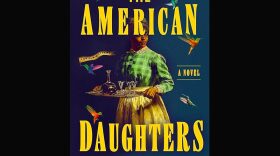-
-
We feature gospel and R&B singer Mavis Staples, from the second installment of our show all about Bob Dylan. Bob Dylan admired the civil rights songs of the Staples Singers and would hear them on tour in the early ‘60s. Mavis Staples remembers when her father, Pops, heard Dylan for the first time and how Dylan’s protest lyrics influenced their family in return.
-
In Lafayette today, our guests are Cedric Watson and Chris Stafford, part of a younger generation that is preserving Cajun and Creole culture by playing the music. Cedric Watson, a fiddler and accordionist who grew up in San Felipe, TX, taught himself the Creole language spoken by some of his elders. Cedric eventually moved to Lafayette where he became involved with several great bands, from the Pine Leaf Boys to his own group, Bijou Creole. Also in Bijou Creole is Chris Stafford, a multi-instrumentalist, producer, and researcher, known for co-founding the band Feufollet when he was eleven years old. We’ll soon hear a bit of Chris and Cedric’s duo set live, but first, I asked the two of them about how playing traditional French music as a duo is different than a full band. Cedric Watson:
-
-
This week on American Routes, it’s a rare Leap Year show with Guilty Pleasures and Forgotten Treasures. As the 29th of February rolls around we take stock of our circles round the sun, just for cosmic fun, not so much to analyze but to imagine our years in space and time. We’ll have music from fellow travelers: The Grateful Dead, Johnny Cash, Aretha Franklin, King Pleasure, and Sun Ra.
-
-
The Carolina Chocolate Drops began as a seminal African American group that revived the old-time string band tradition of the Piedmont where Black performers were formative from the 19th century onward. The Chocolate Drops started out as the Sankofa Strings after meeting at the Black Banjo Gathering in Boone, NC in 2005. They evolved over the next decade. Rhiannon Giddens, trained formally in opera, played banjo and fiddle and sang with her bandmates to growing audiences.
-
The Historic New Orleans Collection spotlights the late Harry Connick Sr.
-
-
Our guest this hour is the late Bob French, a traditional jazz drummer, local radio host, and trenchant commentator on the New Orleans scene, famous for his love of local music. He and I sat down to talk things over a little while back on a comfy couch before his show at the DBA Club downriver in Faubourg Marigny. His father Albert French was a banjo player, but the band tradition goes back to the Original Tuxedo Jazz Orchestra early in the 20th century.
-
-
The Black Masking Indians of New Orleans Carnival—some say Mardi Gras Indians—are neighborhood groups with roots in the late 19th century that include a Chief, a Queen, and roles like Flag Boy, Spy Boy, and Wildman. The Indians are on foot dressed in large, complex, beaded suits depicting Black and Native American histories as warriors with a crown of feathers. They sing, backed by a handmade rhythm section. I walked with Big Chief Tyrone Casby, an educator in everyday life, among his tribe, the Mohawk Hunters, their families and friends in Algiers, on the West Bank of New Orleans.
















